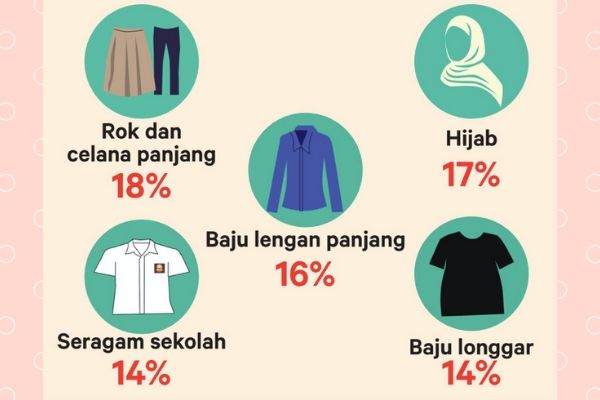Recently, a coalition of Indonesian feminist groups released the results of a very important survey about sexual harassment in the country. One of the main takeaways that has been much discussed in public is the conclusion that women get sexually harassed regardless of how modestly they dress.
The survey, carried out by The Coalition for Safe Public Space (KRPA), which consists of feminist groups Hollaback! Jakarta, perEMPUan, Lentera Sintas Indonesia, Perkumpulan Lintas Feminis Jakarta (JFDG), and Change.org Indonesia, involved 62,000 respondents from all around Indonesia as the coalition sought to dispel prevailing myths about sexual harassment in the public space.
One of those was the common belief that women’s clothing can invite sexual harassment, a myth that is often used to justify victim blaming in sexual harassment incidents, not just in Indonesia but all around the world.
On this, the survey found that most sexual harassment victims in Indonesia were women who did not wear revealing clothing. In fact, 79% of female victims say they were dressed modestly when they were harassed, 18% of whom wore pants/long skirts, 17% wore the hijab, 16% wore long sleeve shirts, 14% wore school uniforms and 14% wore loose-fitting clothes.
While the data has been challenged by victim blamers (“Oh, so 83% of sexual harassment victims did not wear the hijab?” is a common misreading of the data that one can find online), the survey now has a very important backer that could hopefully help quell any of its remaining naysayers: the highest clerical body of the Muslim majority nation, the Indonesian Ulema Council (MUI).
“People covering up their aurat (an Islamic term to describe the parts of the body a person should cover up for the sake of modesty) or not has nothing to do with them wanting or not wanting to be sexually harassed. Someone dressing up modestly according to sharia values does not automatically make them safe from sexual harassment, because the survey says perpetrators disregard clothing,” MUI spokesman Masduki Baidlowi told reporters yesterday, as quoted by Detik.
“The public cannot be permissive [towards sexual harassment] and take it lightly… Everybody must protect and care [for each other]. Especially men, because most of the perpetrators were male.”
The survey, which was carried out at the end of 2018, found that three out of five women have been sexually harassed in public spaces, while the same is true for one in 10 men. Half of those who said they had been harassed said that they had received such treatment when they were underage.
The majority of victims say they were verbally harassed, such as being cat called, blown kisses or been made the targets of sexist remarks, but many also experienced physical harassment such as being groped and rubbed against.
You can read the results of the survey in full here.
ALSO READ: Fighting Back: The women working to end street harassment in Jakarta




